Module 3 Body Language and Non-Verbal Communication Listening and vocabulary&Function课件(22张PPT)
文档属性
| 名称 | Module 3 Body Language and Non-Verbal Communication Listening and vocabulary&Function课件(22张PPT) |
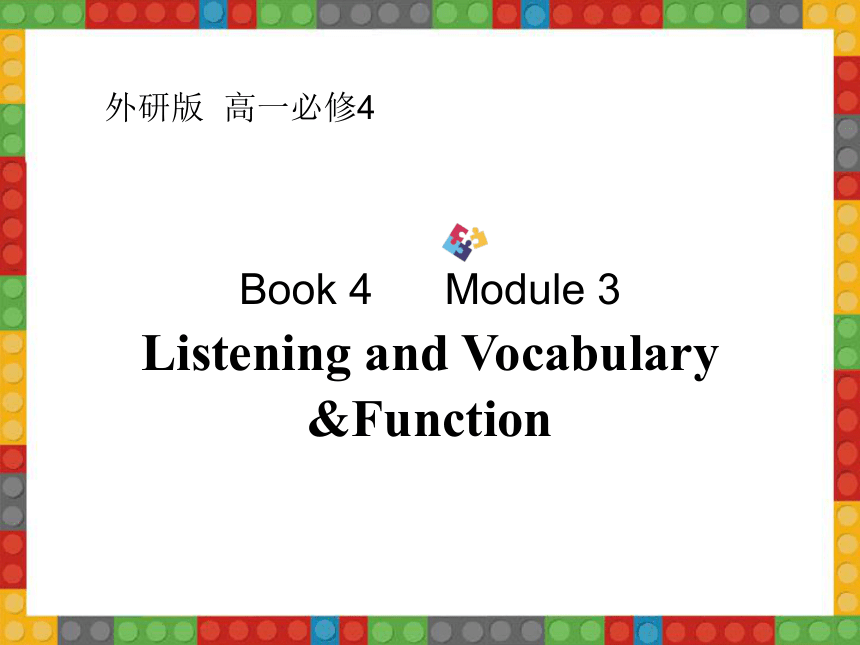
|
|
| 格式 | zip | ||
| 文件大小 | 774.6KB | ||
| 资源类型 | 教案 | ||
| 版本资源 | 外研版 | ||
| 科目 | 英语 | ||
| 更新时间 | 2019-08-19 00:00:00 | ||
图片预览


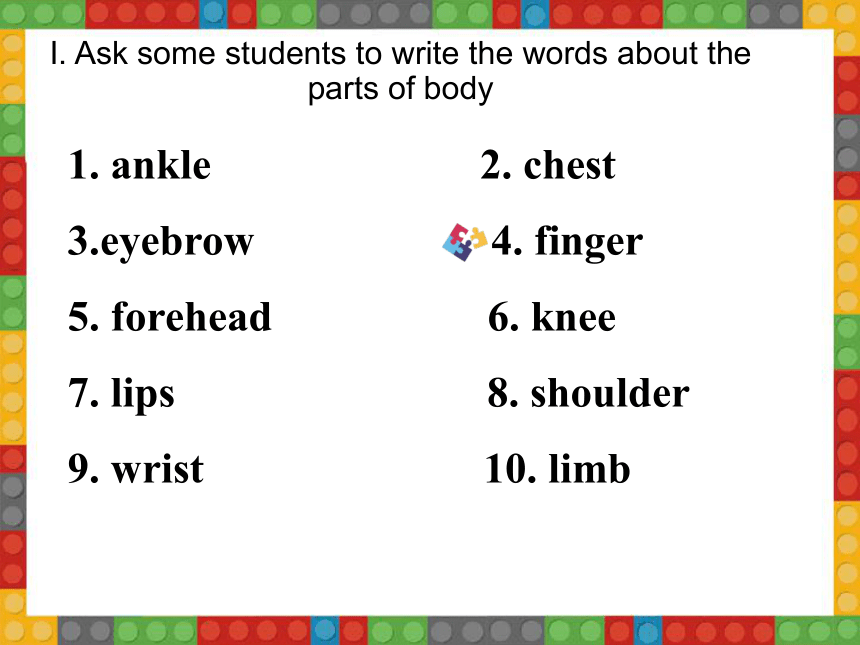
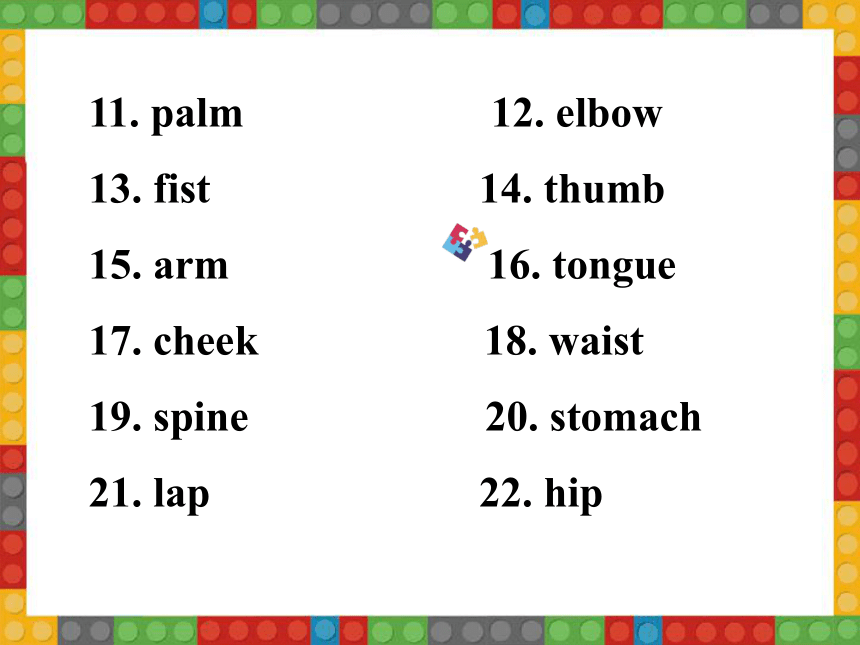

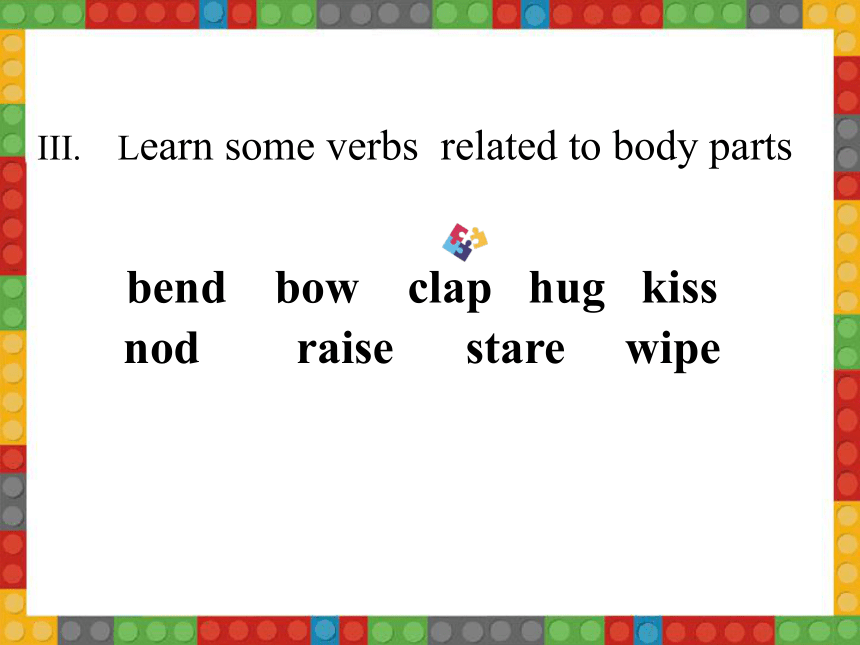
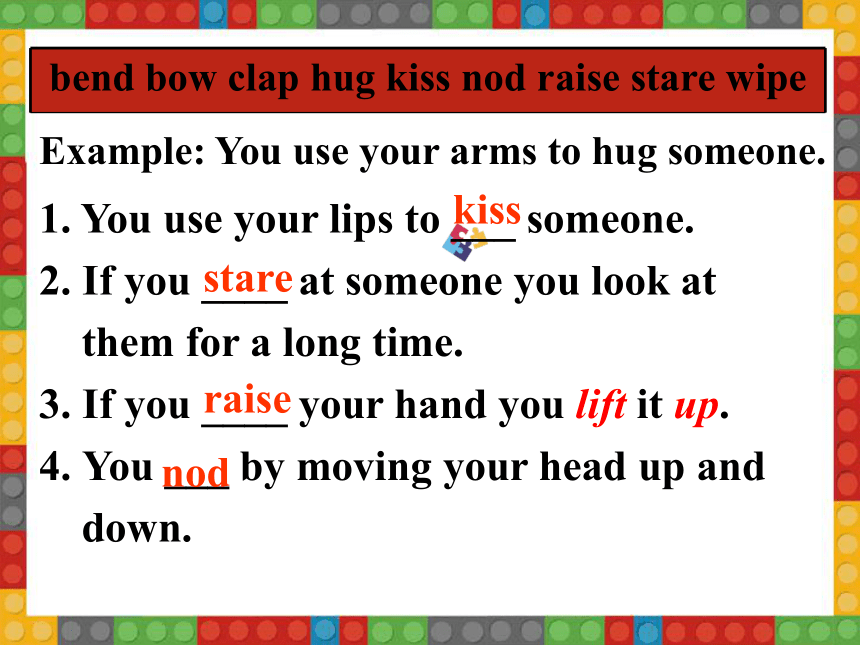
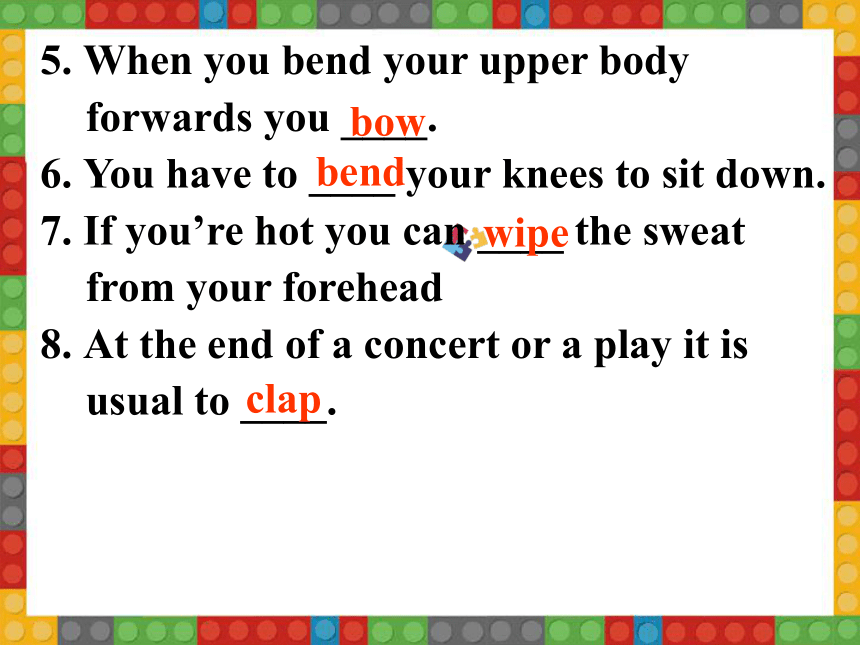

文档简介
课件22张PPT。Listening and Vocabulary
&Function Book 4 Module 3外研版 高一必修41.Learn some words concerning body language, including nouns of body parts and verbs of body movements.
2.Train the students’ listening ability and improve their listening skill.
3.Learn to use “should ,shouldn’t, must, mustn’t ” to give advice.Aims:1. ankle 2. chest
3.eyebrow 4. finger
5. forehead 6. knee
7. lips 8. shoulder
9. wrist 10. limb
I. Ask some students to write the words about the parts of body11. palm 12. elbow
13. fist 14. thumb
15. arm 16. tongue
17. cheek 18. waist
19. spine 20. stomach
21. lap 22. hip
II. Work in pairs and match these words with parts of your body by acting them outbend bow clap hug kiss
nod raise stare wipe III. Learn some verbs related to body parts bend bow clap hug kiss nod raise stare wipe Example: You use your arms to hug someone. 1. You use your lips to ___ someone.
2.?If you ____ at someone you look at them for a long time.
3.?If you ____ your hand you lift it up.
4.?You ___ by moving your head up and down. kiss stareraise nod 5.?When you bend your upper body forwards you ____.
6.?You have to ____ your knees to sit down.
7.?If you’re hot you can ____ the sweat from your forehead
8.?At the end of a concert or a play it is usual to ____. bow bend wipe clap_____What to talk about _____ Gifts _____ When to arrive for dinner _____ What to call people _____ How to meet new people _____ What to say to the host when you leave _____ when to leave the table. IV.Listen to a conversation between an American and a Chinese student who is going to the US. Number the topics in the order they talk about them.
5342176a.?You should shake hands when you meet new people.
b.?You should bring some flowers or a bottle of wine.
c.?You should open gifts immediately.
d.?You shouldn’t use family names.
e.?You shouldn’t arrive too late. V. Match the following pieces of advice with the topics in activity 3. f.?You shouldn’t talk about politics or religion.
g. You mustn’t leave as soon as you finish the meal.
h.?You must thank your host for a wonderful evening.
i.?You mustn’t arrive early. What to talk about:
When to arrive for dinner:
How to meet new people:
When to leave the table:
Gifts:
What to call people:
What to say to the host when you leave: f e, i a gb,c dhFunctionLook at the sentences in Listening and
Vocabulary activity 4 and complete the
sentences below with should or must. Sentences in Listening and Vocabulary
activity 4You should shake hands when you meet new people.
You should bring some flowers or a bottle of wine.
You should open gifts immediately.
You shouldn’t use family names.
You shouldn’t arrive too late. You shouldn’t talk about politics or religion.
You mustn’t leave as soon as you finish the meal.
You must thank your host for a wonderful evening.
You mustn’t arrive early. We use the modal verb ______to give advice.
We use the modal verb ____ to give strong advice.
You ______ means It’s a good idea to ….
You ____ means It’s very important to …should must should must In France you ______ shake hands every time you say hello and goodbye.
In Thailand you _______ touch someone on the head, even by accident.should mustn’t Work in pairs. Guess the customs by completing the advice with should, shouldn’t, must or mustn’t. Do you know…?In Spain you ______ wait until 10 pm before you have dinner.
In Japan you ________ give a penknife as a present.
In Russia you ____ make a toast every time you take a sip from your glass. should shouldn’t must 1. Can I ask you a favour?______
(a) Can I do something for you?
(b) Can you do something for me?
2. How are you doing? ________
(a) How are you?
(b) What are you doing???ba Everyday English
Decide what the phrases mean. 3.?What on earth can I talk about?___
(a) There’s lots to talk about.
(b) I don’t know what to talk about.
4. Have a great time! ____
(a) Enjoy yourself.
(b) Stay a long time. baThankyou
&Function Book 4 Module 3外研版 高一必修41.Learn some words concerning body language, including nouns of body parts and verbs of body movements.
2.Train the students’ listening ability and improve their listening skill.
3.Learn to use “should ,shouldn’t, must, mustn’t ” to give advice.Aims:1. ankle 2. chest
3.eyebrow 4. finger
5. forehead 6. knee
7. lips 8. shoulder
9. wrist 10. limb
I. Ask some students to write the words about the parts of body11. palm 12. elbow
13. fist 14. thumb
15. arm 16. tongue
17. cheek 18. waist
19. spine 20. stomach
21. lap 22. hip
II. Work in pairs and match these words with parts of your body by acting them outbend bow clap hug kiss
nod raise stare wipe III. Learn some verbs related to body parts bend bow clap hug kiss nod raise stare wipe Example: You use your arms to hug someone. 1. You use your lips to ___ someone.
2.?If you ____ at someone you look at them for a long time.
3.?If you ____ your hand you lift it up.
4.?You ___ by moving your head up and down. kiss stareraise nod 5.?When you bend your upper body forwards you ____.
6.?You have to ____ your knees to sit down.
7.?If you’re hot you can ____ the sweat from your forehead
8.?At the end of a concert or a play it is usual to ____. bow bend wipe clap_____What to talk about _____ Gifts _____ When to arrive for dinner _____ What to call people _____ How to meet new people _____ What to say to the host when you leave _____ when to leave the table. IV.Listen to a conversation between an American and a Chinese student who is going to the US. Number the topics in the order they talk about them.
5342176a.?You should shake hands when you meet new people.
b.?You should bring some flowers or a bottle of wine.
c.?You should open gifts immediately.
d.?You shouldn’t use family names.
e.?You shouldn’t arrive too late. V. Match the following pieces of advice with the topics in activity 3. f.?You shouldn’t talk about politics or religion.
g. You mustn’t leave as soon as you finish the meal.
h.?You must thank your host for a wonderful evening.
i.?You mustn’t arrive early. What to talk about:
When to arrive for dinner:
How to meet new people:
When to leave the table:
Gifts:
What to call people:
What to say to the host when you leave: f e, i a gb,c dhFunctionLook at the sentences in Listening and
Vocabulary activity 4 and complete the
sentences below with should or must. Sentences in Listening and Vocabulary
activity 4You should shake hands when you meet new people.
You should bring some flowers or a bottle of wine.
You should open gifts immediately.
You shouldn’t use family names.
You shouldn’t arrive too late. You shouldn’t talk about politics or religion.
You mustn’t leave as soon as you finish the meal.
You must thank your host for a wonderful evening.
You mustn’t arrive early. We use the modal verb ______to give advice.
We use the modal verb ____ to give strong advice.
You ______ means It’s a good idea to ….
You ____ means It’s very important to …should must should must In France you ______ shake hands every time you say hello and goodbye.
In Thailand you _______ touch someone on the head, even by accident.should mustn’t Work in pairs. Guess the customs by completing the advice with should, shouldn’t, must or mustn’t. Do you know…?In Spain you ______ wait until 10 pm before you have dinner.
In Japan you ________ give a penknife as a present.
In Russia you ____ make a toast every time you take a sip from your glass. should shouldn’t must 1. Can I ask you a favour?______
(a) Can I do something for you?
(b) Can you do something for me?
2. How are you doing? ________
(a) How are you?
(b) What are you doing???ba Everyday English
Decide what the phrases mean. 3.?What on earth can I talk about?___
(a) There’s lots to talk about.
(b) I don’t know what to talk about.
4. Have a great time! ____
(a) Enjoy yourself.
(b) Stay a long time. baThankyou
